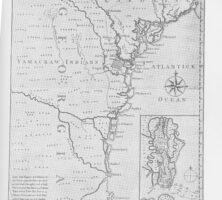As the forceful ruler of the Creek town of Coweta, on the Chattahoochee River fifteen miles south of Columbus, Brims was the first of a line of strong Lower Creek leaders during the eighteenth century and set the standard for their diplomatic policy of neutrality. His stance of regular interaction with all European empires—Spanish, French, and British—earned him mixed evaluations among foreigners and natives, who applauded his clever schemes or condemned his crafty fluctuations.
His date of birth and the place of his birth and death remain unknown, but Brims operated in Georgia during the early eighteenth century. He filled the positions of mico (ruler) and warrior for the town of Coweta, and his multiple skills gained him the title emperor. He began a powerful lineage, including Chigelli (brother), Malatchi (son), and Togulki (grandson), all of whom upheld his political strategy, and he was probably uncle to Mary Musgrove, although her exact claims of kinship are unclear.
Brims’s greatest moments occurred during the Yamasee War of 1715 and the subsequent decade. Brims originally supported the Yamasee, who were distantly related to the Creeks, in their quest for revenge for abuses by South Carolinians. When circumstances changed, Brims began talks with several European and Indian nations to determine the best course of action for Coweta. He eventually negotiated peace and trading privileges with the British, but he remained open to the possibility of future opportunities elsewhere and refused to pledge unconditional support to Charleston, South Carolina. Brims spent the decade of the 1720s establishing this neutral attitude and earning a reputation as a shrewd bargainer who always acted in the interests of his fellow Lower Creeks.






